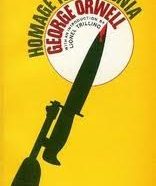“Homage to Catalonia” by George Orwell #3
Why was Orwell doing this when he didn’t have to? The reason can found in sentences such as this one: “It was an extraordinary life that we were living – an extraordinary way to be at war, if you could call it a war.” The first reason given is that it was extraordinary, and like any writer, he was drawn to that. He saw the extraordinary as a challenge to his intellect, his body and as a vocation. In his essay, Why I Write, Orwell’s searingly honest about what makes a writer: “[T]here is a minority of gifted, wilful people who are determined to live their own lives to the end, and writers belong in this class. Serious writers, I should say, are on the whole more vain and self-centred than journalists, though less interested in money.” This is as bad as it gets with Orwell; the other reasons are far more laudable and inspiring. He felt the urge to find truth wherever he went; he calls it an “historical impulse”; and there’s also the “political purpose”, very much evident in Homage. He wrote: “The Spanish war and other events in 1936-7 turned the scales and thereafter I knew where I stood. Every line of serious work that I have written since 1936 has been written, directly or indirectly, against [italics] totalitarianism and for [italics] Socialism.” Then he writes something truly beautiful, something which somehow captures the essence of what it is to be a writer but also to be fully human: “So long as I remain alive and well I shall continue to feel strongly about prose style, to love the surface of the earth, and to take pleasure in solid objects and scraps of useless information.” He explains his reason for writing Homage: “I happened to know, what very few people in England had been allowed to know, that innocent men were being falsely accused [of plotting with Franco]. If I had not been angry about that I should never have written the book.”
When he wrote, ” if you could call it a war” Orwell betrayed something about his vocation as a writer. It is something evident in much of his writing, something he explained himself as an ability to accept life’s harsh realities. Imperfection seemed to attract him; he wasn’t an idealist yet he found space for those who wanted greater things; he had sympathy with anyone whose motives were honourable, regardless of their success or failure – take Bob Smillie: “Perhaps the best of the bunch was Bob Smillie – the grandson of the famous miners’ leader – who afterwards died such an evil and meaningless death in Valencia.” And there was the fall of Malaga, allegedly due to treachery: “It set up in my mind the first vague doubt this war in which, hitherto, the rights and wrongs had seemed so beautifully simple.” There’s rarely if ever any bitterness in Orwell’s words: anger sometimes maybe and often criticism but mostly just a kind of detachment acknowledgement of the situation as he saw it.
The description of crossing no-man’s land to engage the enemy that appears in Chapter 6 contains a detail about ants: “When you are creeping at that pace you are aware as an ant might be of the enormous variations on the ground.” He writes about the fear of being shot in the face, which was the worst of all. It is at moments like these – and there are many of them – that I feel an empathy with Orwell; I’ve often imagined being in a battle and am appalled by the thought of being shot in the face. A man called Hiddlestone was shot with a bullet that travelled right up his arm. There was, clearly, no way of knowing how a bullet behaves once it enters your body.
The book is replete with romantic detail like how they’d catch quail and how the Andalusians were far better at rolling tobacco than the Catalans even though they were viewed as inferior.
R.H.






